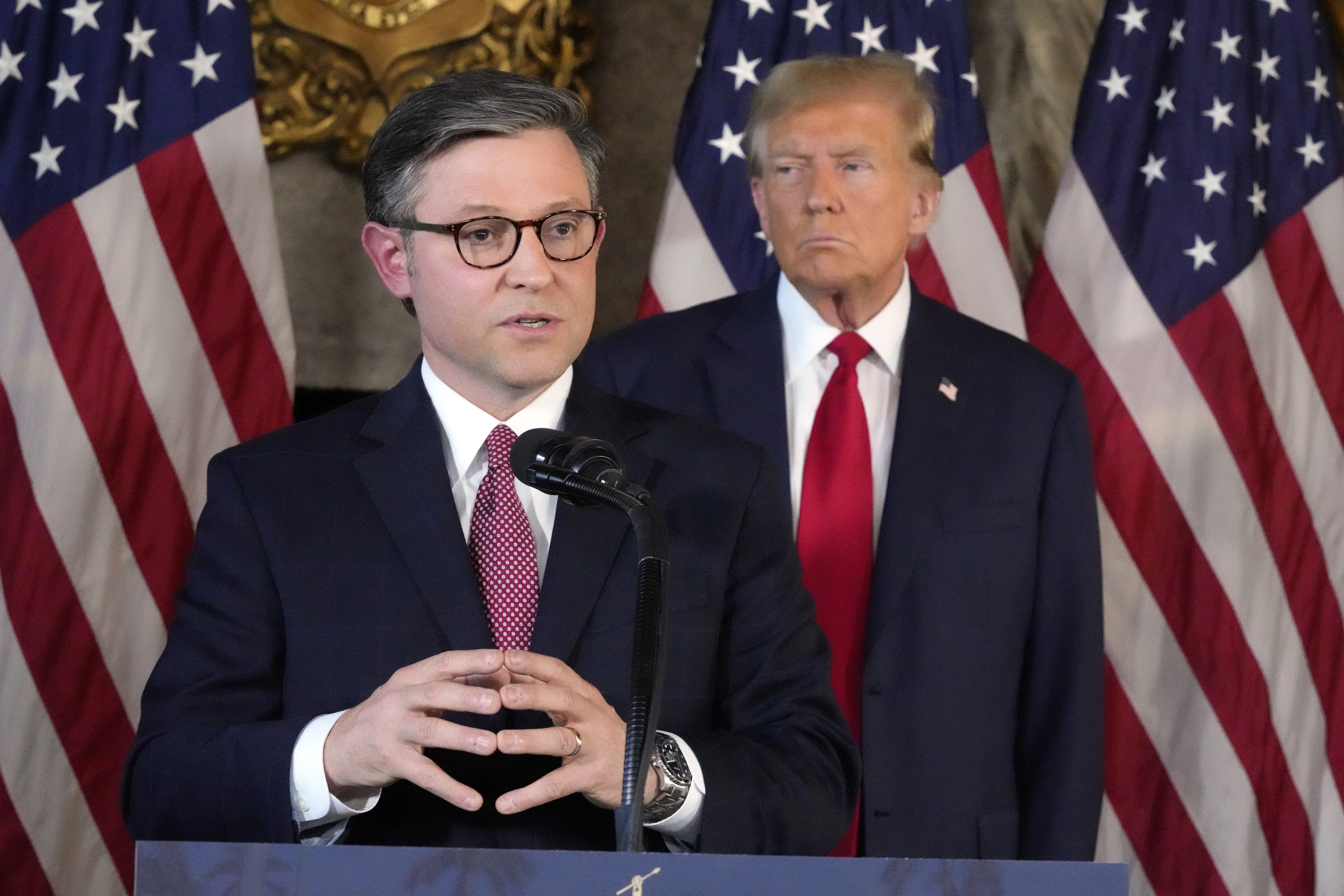Mike Johnson is the speaker of the House today for one main reason: Predecessor Kevin McCarthy simply could not master the job.
In recent weeks, and with increasing confidence in the past few days, the new speaker has passed an early test: He’s demonstrated that Mike Johnson is no Kevin McCarthy.
He is not someone who GOP politicians can torment with impunity. He has aligned himself with former President Donald Trump — indispensable for a Republican in his position — while not being treated like a golden retriever, as Trump did with “my Kevin.” He is disliked by Democrats, naturally, but not generally held in abject contempt.
He, in short, is not a Washington joke — or at least not as much of one as seemed possible when he took the speaker’s gavel almost by accident, the political equivalent of Forrest Gump.

“The reality is, in the last month-plus … he’s been able to get the job done despite all of the efforts to undermine him,” Rep. Mike Lawler (R-N.Y.) said. “He’s doing an effective job as speaker and building consensus both within the conference and navigating a divided government.”
One reason Johnson is passing his early leadership test is that it’s being graded on a curve. The speaker is hassled by the same unruly forces that harried McCarthy for nine months in 2023 before hounding him out of office in October. Few people will be surprised if, in due course, Johnson’s antlers also hang on the wall of the right-wing rec room.
At a minimum, however, Johnson has fortified his reputation in consequential ways. Substantively, Johnson is an authentic movement conservative in a way that McCarthy never was, while pushing much the same agenda and seeking the same sort of compromises: deals on federal spending, foreign assistance and surveillance — all of which provoke the right.
But Johnson has been successful in isolating his critics in a way McCarthy never could. He brushed off threats to oust him from the speakership and casually dismissed one of the loudest voices, Rep. Marjorie Taylor Greene (R-Ga.), as an unserious lawmaker. He appears to have convinced Greene to retreat from her threats to force a vote on Johnson’s speakership (for now, at least) without allowing any real concessions. Their talks, he told reporters, were “not a negotiation,” with her requests to be “processed” in due course.
And on Tuesday, Johnson made plain he expects to continue leading Republicans after the November election — which runs counter to most predictions heard in GOP circles.
“I intend to lead this conference in the future and the most important thing we have to do right now is govern the country well, show the American people that we are and that’s what we have been doing,” he told reporters.
Slow but skillful
To be sure, Johnson’s recent swagger can — and probably should — be attributed mostly to the grace of Trump. The former president personally stuck his neck out to quell the recent uprising, forcing Greene to think twice about moving against the speaker in an election year — not to mention crossing the king of MAGA himself.
Trump’s intervention may have less to do with affection for Johnson than with concern about the political backlash against what would be a new round of Republican chaos on the hill. Even still, it represents a stark contrast with Trump’s decision to stand pat last fall as McCarthy faced his assassins.
“I think when your presidential nominee … is on your side against chaos, I think that obviously strengthens your hand,” Rep. Kelly Armstrong (R-N.D.) said.
But Johnson has also proved deft in recent months at handling his members. And while he has hardly achieved the formidable reputation of former Speaker Nancy Pelosi — who kept Democrats mostly unified in a way House Republicans haven’t been for decades — several episodes have shown him to be nimble in situations with scant room for maneuver.
Early on, Johnson showed a willingness to listen to his most conservative members. They were wary of being jammed with yet another massive omnibus spending bill, so he embraced a two-step approach hatched by Freedom Caucus Rep. Andy Harris (R-Md.) that Democrats and many GOP appropriators initially found silly. But he stuck with the idea and started building trust on the right.
More recently, by converting a portion of U.S. aid to Ukraine into a “loan,” he was able to frame passage of foreign assistance — a major ask from President Joe Biden and Democrats — as a win for Trump. That was an audacious spin, and Trump bought it.
And when Johnson was most vulnerable last month — just when Greene’s threat to his gavel was gaining traction — he locked arms with Trump, a lesson he clearly learned from his predecessor. He visited Mar-a-Lago for a news conference on “election integrity,” a huge priority for Trump, and was rewarded with an unofficial endorsement and timely photo op with the ex-president.
But Johnson also hasn’t bowed to Trump’s every whim the way McCarthy regularly did. When the ex-president insisted that GOP lawmakers kill an extension of foreign surveillance authorities, for example, Johnson bulled forward — personally providing the deciding vote on a key amendment — and got the legislation to Biden’s desk.
That’s not to say conservatives are happy with Johnson. Many on the House GOP’s rightmost flank clearly are not. “Everybody expected him to be a true conservative and to fight,” said Rep. Ralph Norman (R-S.C.). “He has just not made the decisions we thought he would make.”
Yet in the same breath, Norman noted approvingly that Johnson has shown “he’s not scared of” Greene’s threats and applauded his willingness to listen.
An honest broker
Most frequently, though, members praise Johnson as someone who keeps his word. To put it mildly, that was never a McCarthy signature.
Johnson told GOP defense hawks privately months ago he’d get Ukraine aid passed. They trusted him and he delivered at a time when most well-informed reporters and senior Republicans doubted it could ever pass the House.
The strange new respect has crept across the aisle, as well. Where McCarthy enraged Democrats by reneging on a spending deal with Biden after a right-wing backlash, Johnson has operated in good faith, those who have negotiated against him say, laying out specifically what he needs to deliver passage of critical legislation and avoiding confrontational policy demands pushed by his right flank.
They also appreciate that Johnson has stayed respectful of the opposition. Sure, Johnson is still blasting the administration on their handling of college protests and the “weaponization” of the DOJ. But unlike McCarthy, he’s not making deals with them one day and then attacking them personally on TV a few hours later.
Conversely, Johnson has avoided making promises he can’t keep — another habit that helped precipitate McCarthy’s downfall. The fallen speaker was notorious for telling people what they wanted to hear — whether it was vowing to Trump that he’d expunge his impeachment record and not following through, or promising conservative rabble-rousers more power only to change their agreement after they backed him as speaker.
Johnson also takes meetings with hard-liners and mulls over their ideas — too much, some senior Republicans think. But he’s also delivered tough talk to his members in a way that McCarthy never did.
Case in point: In a recent GOP conference meeting, Rep. Debbie Lesko (R-Ariz.) needled Johnson about how Republicans were supposed to explain to constituents that they’re not addressing the border crisis while voting to send billions of dollars to other countries. Johnson shot back with a reality check: I fought like hell for border security, he told her, but until Trump is president again, no true border fix is possible.
“I’m frustrated with some of the votes, but I realize … he hasn’t lied to us,” said Rep. Tim Burchett (R-Tenn.), one of the eight GOP hard-liners who voted to oust McCarthy. “His prior votes were a lot different, but when you’re in leadership, I understand [it’s] a different scenario.”
Anthony Adragna, Olivia Beavers and Jordain Carney contributed to this report.






